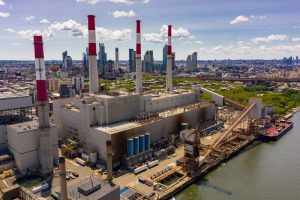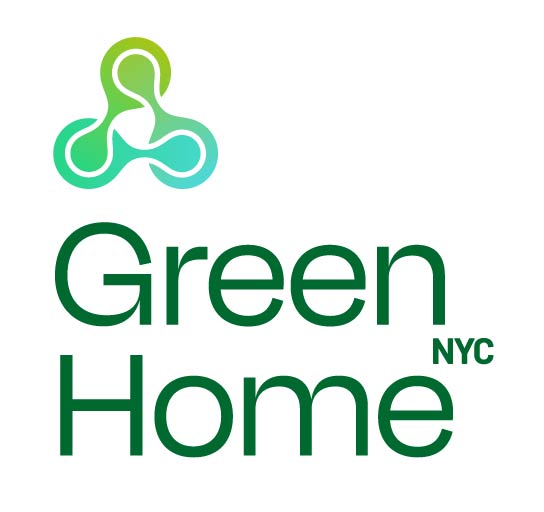Here are real ways that New Yorkers can help.
By Matthew Hayek
The turmoil caused by the COVID-19 pandemic has us yearning for a silver lining. Many have pointed to
clear skies and
wildlife returning to cities as inspiring signs that the economic slowdown is giving mother earth the chance to breathe. However, without structural changes to our dirty economy, clear skies will inevitably be short-lived, as pollution is bound to return when activity revs back up. Highly impacted areas of China, for instance, are already seeing emissions levels
rebound.
Our economy is tied to burning fossil fuels. While low emissions today can seem inspiring, the economic consequences have been nothing short of disastrous, with more than
1.2 million unemployed New Yorkersseeking relief. Many are struggling to feed themselves and senior citizens will have to further postpone their retirement.
COVID-19 is also harming marginalized racial groups at higher rates than whites, possibly because nonwhite people are
more likely to have jobs deemed essential in the shutdown, and because of high rates of underlying health conditions and
environmental pollution in non-white neighborhoods. Environmentalists can look tone-deaf and callous by celebrating some fringe benefits of a shutdown that worsens social inequality, coming across as more concerned with the planet than with people.

Champions of sustainability have a formidable task during the recovery ahead: fight for an economy that provides fair and prosperous livelihoods
without relying on pollution and ecological destruction, all while staying at home.
The first part of the fight involves raising awareness of regulatory rollbacks. The EPA is
suspending enforcement for companies to monitor and report pollution. It is also seeking to roll back Obama-era policies to
limit deadly mercury pollution and improve
automobile fuel efficiency. The novel coronavirus can serve as an all too convenient excuse for deregulation.
The bigger challenge ahead is in creating climate-smart jobs and zero-emission targets. Only systematic changes to our policies and economy can ensure that the eventual recovery doesn’t come from high emissions. Calling your legislators to insist on a green recovery plan is a great first step. Joining a local or
national climate organization is a better step still.
Federal action may be thwarted by political gridlock. Although pessimism isn’t an excuse to stop fighting, progress can be made at the local level. New York City’s
OneNYC 2050 plan made serious commitments to carbon neutrality before 2050. New Yorkers must pressure the city and state government to keep their commitments. In the process, we can find more opportunities to fight our simultaneous crises, for instance through affordable, energy efficient housing.
New York has
suspended composting and other beneficial programs out of short-sighted budgetary concerns. Green programs
save money in the long run. New Yorkers should fight against this policy but keep their eyes on the prize: home heating and energy, transportation, and food consumption make up the majority of New Yorkers’ greenhouse gas footprint. And we need individual
and institutional actions to become carbon neutral well before 2050.
One major climate opportunity that many New Yorkers overlook is their plates. Agriculture makes up a quarter of global emissions, and meat and dairy are by far the
most intensive foods. This is especially important in the time of COVID-19, which likely originated from wild animals kept in confinement for sale and slaughter, mirroring how we treat farm animals daily in the US. The last viral epidemic of this size possibly originated at a
chicken farm in 1918.
Within recent decades, we have had a number of near-misses of global pandemic swine and bird flus originating from highly-crowded factory-like farms. Crowded animal farms also spawn antibiotic resistant bacteria, using
four times more antibiotics than humans.
Experts predict that the next big pandemic will originate from intensively farmed animals.
Highly concentrated animal farming today produces more than 99% of Americans’ meat, eggs, and milk. Replacing an occasional meal with farmers’ market meat is a laudable step but not nearly enough; local farms alone can’t replace the 220 pounds of meat that Americans consume each year.

New Yorkers can create plant-forward recipes at home and explore the city’s diverse vegan takeout options. We also need institutional action to purchase and promote plant-based meals. Meatless Mondays at
NYC public schools have been a great start. Forward-thinking companies are making plant-based protein options the
default in workplace cafeterias and catered events. Hospitals can provide
healthier meals to patients, helping them recover from disease. Our public and private dollars are also invested in meat and dairy companies. We can recognize these as extraordinarily
high-risk investments and, just like with fossil fuels, divest.
New Yorkers are at the forefront of multiple crises: crowded hospitals, economic shutdown, food insecurity, and rising sea levels. Tomorrow, we have an opportunity to build a healthier, lower-carbon economy in the wake of this crisis, but that depends upon New Yorkers’ collective will to organize today for less meat, renewable energy, better transportation, and social equality.
Matthew Hayek is an Assistant Professor at the NYU Department of Environmental Studies. His research quantifies the environmental impacts of our food system, with a specific focus on its contributions to climate change.
 Champions of sustainability have a formidable task during the recovery ahead: fight for an economy that provides fair and prosperous livelihoods without relying on pollution and ecological destruction, all while staying at home.
The first part of the fight involves raising awareness of regulatory rollbacks. The EPA is suspending enforcement for companies to monitor and report pollution. It is also seeking to roll back Obama-era policies to limit deadly mercury pollution and improve automobile fuel efficiency. The novel coronavirus can serve as an all too convenient excuse for deregulation.
The bigger challenge ahead is in creating climate-smart jobs and zero-emission targets. Only systematic changes to our policies and economy can ensure that the eventual recovery doesn’t come from high emissions. Calling your legislators to insist on a green recovery plan is a great first step. Joining a local or national climate organization is a better step still.
Federal action may be thwarted by political gridlock. Although pessimism isn’t an excuse to stop fighting, progress can be made at the local level. New York City’s OneNYC 2050 plan made serious commitments to carbon neutrality before 2050. New Yorkers must pressure the city and state government to keep their commitments. In the process, we can find more opportunities to fight our simultaneous crises, for instance through affordable, energy efficient housing.
New York has suspended composting and other beneficial programs out of short-sighted budgetary concerns. Green programs save money in the long run. New Yorkers should fight against this policy but keep their eyes on the prize: home heating and energy, transportation, and food consumption make up the majority of New Yorkers’ greenhouse gas footprint. And we need individual and institutional actions to become carbon neutral well before 2050.
One major climate opportunity that many New Yorkers overlook is their plates. Agriculture makes up a quarter of global emissions, and meat and dairy are by far the most intensive foods. This is especially important in the time of COVID-19, which likely originated from wild animals kept in confinement for sale and slaughter, mirroring how we treat farm animals daily in the US. The last viral epidemic of this size possibly originated at a chicken farm in 1918.
Within recent decades, we have had a number of near-misses of global pandemic swine and bird flus originating from highly-crowded factory-like farms. Crowded animal farms also spawn antibiotic resistant bacteria, using four times more antibiotics than humans. Experts predict that the next big pandemic will originate from intensively farmed animals.
Highly concentrated animal farming today produces more than 99% of Americans’ meat, eggs, and milk. Replacing an occasional meal with farmers’ market meat is a laudable step but not nearly enough; local farms alone can’t replace the 220 pounds of meat that Americans consume each year.
Champions of sustainability have a formidable task during the recovery ahead: fight for an economy that provides fair and prosperous livelihoods without relying on pollution and ecological destruction, all while staying at home.
The first part of the fight involves raising awareness of regulatory rollbacks. The EPA is suspending enforcement for companies to monitor and report pollution. It is also seeking to roll back Obama-era policies to limit deadly mercury pollution and improve automobile fuel efficiency. The novel coronavirus can serve as an all too convenient excuse for deregulation.
The bigger challenge ahead is in creating climate-smart jobs and zero-emission targets. Only systematic changes to our policies and economy can ensure that the eventual recovery doesn’t come from high emissions. Calling your legislators to insist on a green recovery plan is a great first step. Joining a local or national climate organization is a better step still.
Federal action may be thwarted by political gridlock. Although pessimism isn’t an excuse to stop fighting, progress can be made at the local level. New York City’s OneNYC 2050 plan made serious commitments to carbon neutrality before 2050. New Yorkers must pressure the city and state government to keep their commitments. In the process, we can find more opportunities to fight our simultaneous crises, for instance through affordable, energy efficient housing.
New York has suspended composting and other beneficial programs out of short-sighted budgetary concerns. Green programs save money in the long run. New Yorkers should fight against this policy but keep their eyes on the prize: home heating and energy, transportation, and food consumption make up the majority of New Yorkers’ greenhouse gas footprint. And we need individual and institutional actions to become carbon neutral well before 2050.
One major climate opportunity that many New Yorkers overlook is their plates. Agriculture makes up a quarter of global emissions, and meat and dairy are by far the most intensive foods. This is especially important in the time of COVID-19, which likely originated from wild animals kept in confinement for sale and slaughter, mirroring how we treat farm animals daily in the US. The last viral epidemic of this size possibly originated at a chicken farm in 1918.
Within recent decades, we have had a number of near-misses of global pandemic swine and bird flus originating from highly-crowded factory-like farms. Crowded animal farms also spawn antibiotic resistant bacteria, using four times more antibiotics than humans. Experts predict that the next big pandemic will originate from intensively farmed animals.
Highly concentrated animal farming today produces more than 99% of Americans’ meat, eggs, and milk. Replacing an occasional meal with farmers’ market meat is a laudable step but not nearly enough; local farms alone can’t replace the 220 pounds of meat that Americans consume each year.
 New Yorkers can create plant-forward recipes at home and explore the city’s diverse vegan takeout options. We also need institutional action to purchase and promote plant-based meals. Meatless Mondays at NYC public schools have been a great start. Forward-thinking companies are making plant-based protein options the default in workplace cafeterias and catered events. Hospitals can provide healthier meals to patients, helping them recover from disease. Our public and private dollars are also invested in meat and dairy companies. We can recognize these as extraordinarily high-risk investments and, just like with fossil fuels, divest.
New Yorkers are at the forefront of multiple crises: crowded hospitals, economic shutdown, food insecurity, and rising sea levels. Tomorrow, we have an opportunity to build a healthier, lower-carbon economy in the wake of this crisis, but that depends upon New Yorkers’ collective will to organize today for less meat, renewable energy, better transportation, and social equality.
Matthew Hayek is an Assistant Professor at the NYU Department of Environmental Studies. His research quantifies the environmental impacts of our food system, with a specific focus on its contributions to climate change.
New Yorkers can create plant-forward recipes at home and explore the city’s diverse vegan takeout options. We also need institutional action to purchase and promote plant-based meals. Meatless Mondays at NYC public schools have been a great start. Forward-thinking companies are making plant-based protein options the default in workplace cafeterias and catered events. Hospitals can provide healthier meals to patients, helping them recover from disease. Our public and private dollars are also invested in meat and dairy companies. We can recognize these as extraordinarily high-risk investments and, just like with fossil fuels, divest.
New Yorkers are at the forefront of multiple crises: crowded hospitals, economic shutdown, food insecurity, and rising sea levels. Tomorrow, we have an opportunity to build a healthier, lower-carbon economy in the wake of this crisis, but that depends upon New Yorkers’ collective will to organize today for less meat, renewable energy, better transportation, and social equality.
Matthew Hayek is an Assistant Professor at the NYU Department of Environmental Studies. His research quantifies the environmental impacts of our food system, with a specific focus on its contributions to climate change.